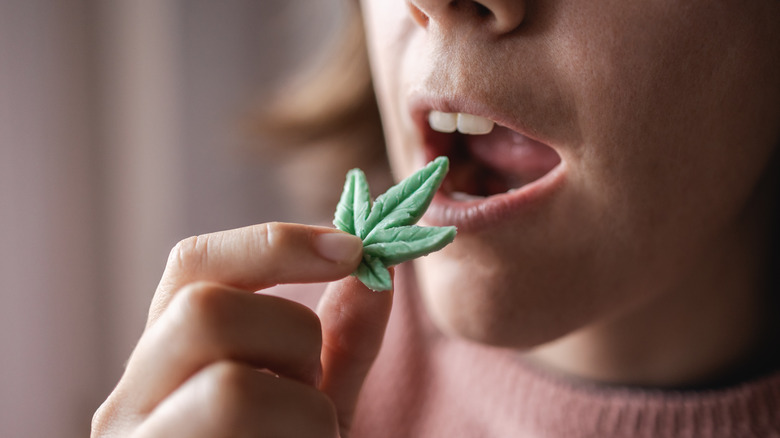Research Finds Unexpected New Stats About Pregnant People And Cannabis
During the midterm elections earlier this month, Missouri and Maryland joined an ever-growing list of states legalizing cannabis. Currently, recreational marijuana use is legal in 21 states as well as in Washington D.C. and Guam, per Business Insider. A recent poll published by Pew Research Center actually shows that 88% of U.S. adults think the drug should be legal for medical and recreational use — a number that has been steady for at least the past year.
As an herbal therapy, marijuana has been found to relieve pain and has even been proven to help reduce nausea symptoms associated with chemotherapy. It's why despite some states not legalizing recreational use, all allow medical marijuana as a cancer treatment. According to Cancer Care, patients can use marijuana to help manage pain, nausea, vomiting, neuropathy, appetite, and weight loss. The Mayo Clinic adds medical marijuana is also widely approved and used for the treatment of Alzheimer's disease, ALS, HIV/AIDS, Crohn's disease, epilepsy, glaucoma, multiple sclerosis, and pain and nausea not associated with cancer treatment.
While there is a growing concern over hyperemesis syndrome and cyclical vomiting among heavy marijuana users, a study published by the Journal of Clinical Gastroenterology — which had participants self-report medical marijuana use through the Releaf App — found the majority of patients using cannabis to ease nausea symptoms found relief.
New research has, however, found a troubling trend rising among pregnant people that could have serious effects on a growing fetus, per Healthline.
Marijuana use on the rise among pregnant people
Tara, a pregnant 31-year-old living in Los Angeles, told The Cut she started using marijuana again to help ease her nausea at the suggestion of her midwife. According to Tara, she was vomiting upwards to seven times a day and, given that her pregnancy was unplanned and mid-pandemic, she felt her nausea was as much from anxiety as it was from hormones.
She isn't alone, either. Research shows over the past two decades, cannabis use has been steadily increasing despite the proven risks associated with use. The latest study at the time of the writing of this article was published on November 29 by The American Journal of Drug and Alcohol Abuse and found that in states where marijuana was legal, pregnant people were about 4.6 times as likely to use cannabis than in states where it wasn't. The main reason for use, the study found, was exactly why Tara started using marijuana during her pregnancy: to help curb morning sickness.
But doctors don't believe the risks outweigh the benefits. Just this year, one study found an "increased risk of premature birth and low birth weight" associated with cannabis use, while another found children who had been exposed to marijuana in utero had a risk of developing high blood sugar. Healthline adds exposure can also lead to "inattention, hyperactivity, learning and behavioral problems, poor working and short-term memory," and other "mental health issues" starting in childhood.
Experts warn against CBD and THC use during pregnancy
Cannabidiol (CBD) might not have THC — the part of the marijuana plant that induces intoxication — but it doesn't make it any safer for use during pregnancy, per the American Pregnancy Association (APA). On their website, the APA explains that little research has been done on humans, but studies of CBD use with pregnant animals have found fetal development issues. The FDA "strongly advises" against using CBD, THC, or "marijuana in any form during pregnancy or while breastfeeding."
To help curb nausea, Tara told The Cut her OBGYN prescribed Diclegis — a drug that has been found to have zero side effects on fetal development. For Tara, however, the side effects included extreme anxiety, depression, and food aversion.
The dangers pregnant people face for using marijuana aren't just medical, either. In May 2019, The Lily reports one woman on Arizona's child abuse Central Registry list after she used medical marijuana to treat her hyperemesis gravidarium — a condition that can cause severe vomiting, weight loss, dehydration, and increased risk of miscarriage. In Alabama, if a pregnant person tests positive for THC, they can be arrested, fined, and sent to jail (via WAFF).
The Lily adds that legal consequences for marijuana use while pregnant disproportionally affect people with lower incomes and people of color. Black and Brown parents are not only drug tested and reported at a higher right, but they also have a higher rate of losing their parental rights over drug charges.


